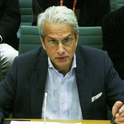Scotland Yard has set up a new inquiry into allegations of serious crime in Rupert Murdoch’s UK newspapers—as a direct result of stories published by Prospect.
On 1st May, the magazine carried two detailed investigations. One reported allegations that Murdoch executives had perverted the course of justice by destroying masses of material that was needed by police and the courts. The other disclosed new evidence that the Murdoch company interfered with the heart of UK government by using criminal methods to spy on senior politicians for commercial purposes. The Murdoch company has denied all allegations of wrongdoing.
On the day after Prospect hit the newsstands, the former prime minister Gordon Brown wrote to the Metropolitan Police commissioner, Sir Mark Rowley, drawing his attention to the articles and calling for the opening of a new criminal investigation.
Rowley has now written back to Brown to tell him that “the contents of your letter, dated May 2nd 2024, is (sic) being considered by the Met’s special enquiry team (SET). This sits under our central specialist crime command which assesses high profile matters.”
It is believed that, at this stage, Rowley has established a limited “scoping inquiry” to consider the strength of the new evidence cited by Prospect. If this initial inquiry develops into a full investigation, those who may be interviewed about the allegations include Murdoch’s UK chief executive, Rebekah Brooks; her former close colleague, Will Lewis, who is now publisher of the Washington Post; and Rupert Murdoch and his son, James. They have all denied wrongdoing.
The Prospect articles were based on hundreds of pages of legal paperwork that had been deployed in the High Court. This paperwork draws on thousands of items of evidence that the Murdoch company has been forced to disclose on orders from the court, as some 1,600 claimants have sued over the hacking of their phones. Much of this evidence was not available to earlier police inquiries. Most of it was not covered by other major newspapers.
One of the Prospect stories cited by Brown quotes a document that has been deployed in court by the claimants and that accuses the Murdoch company—which used to publish the News of the World—of “fraudulent conspiracy and/or dishonesty, bad faith and sharp practice”.
This referred to evidence that during a five-month period when the claimants and then Scotland Yard had warned the company to preserve evidence, senior executives organised the deletion of some 30m emails and of the backup tapes that contained copies of the emails; as well as the destruction of computers; and the disappearance of filing cabinets, paperwork and tapes from the company’s premises.
The Murdoch company says that the Prospect coverage was one-sided and that the company has not engaged in any destruction or concealment with the intention of covering up crime. It says that the deletion of emails was necessary because the servers were overloaded; paperwork and other material was cleared out in the natural course of running a crowded newsroom; and computers were due to be destroyed and replaced because they were moving to a new building.
In his letter, Brown drew special attention to evidence disclosed by Prospect of “the creation of a cover-up seemingly incriminating me in an alleged conspiracy to obtain documents unlawfully.” This referred to Murdoch executives telling police in 2011 that they had deleted millions of emails as a security move after they were told that a former employee who was sympathetic to the Labour party had passed Rebekah Brooks’s emails to Gordon Brown and to the Labour MP Tom Watson. Brown and Watson have dismissed this as a fake story to justify the destruction of evidence.
The other Prospect story to which Brown’s letter referred used the High Court paperwork to disclose that the mobile phones of senior politicians had been targeted by many hundreds of suspicious calls from the Murdoch building in east London. This included MPs on the select committee that was investigating the phone-hacking scandal and the senior ministers who were dealing with Murdoch’s attempt to take over all of BSkyB.
The Murdoch company say that these calls were simply the legitimate work of journalists researching stories.
News Group Newspapers, a Murdoch company, said: “These allegations have nothing to do with seeking compensation for victims of phone hacking or unlawful information gathering and should be viewed with considerable caution not only in relation to their veracity but also in the light of those who are behind them. Lawyers for the claimants work with a group of former phone hackers and employ anti-press campaigners and activists who seek to use the compensation claims to make allegations in circumstances they are protected in doing so [sic] by open justice principles.
[The latest accusations] are irrelevant to the fair and just determination of claims.”
A spokesperson for News Group Newspapers, a Murdoch company, said:
“In 2011, an unreserved apology was made by NGN to victims of voicemail interception by the News of the World. Since then, NGN has been paying financial damages to those where either there has been wrongdoing (in the case of the News of the World) or for good commercial reasons in the case of allegations against the Sun where liability is not accepted.
These proceedings have now been going on for over 15 years and NGN is seeking to bring them to a close. Between 2011–2015, a large-scale police investigation resulted in the trials of many individuals in the criminal courts. Corporate liability was also investigated at length and, in 2015, the Crown Prosecution Service concluded that there was no evidence to support charges against the company.
The claimants have [now] sought to introduce accusations to the civil court against many current and former journalists, staff and senior executives of News International in a scurrilous and cynical attack on their integrity. Some of these allegations date back to events now 30 years old and relate to allegations which are irrelevant to the matters which are now in issue between the parties. Many of these have been investigated in depth on previous occasions.
These allegations have nothing to do with seeking compensation for victims of phone hacking or unlawful information gathering and should be viewed with considerable caution not only in relation to their veracity but also in the light of those who are behind them. Lawyers for the claimants work with a group of former phone hackers and employ anti-press campaigners and activists who seek to use the compensation claims to make allegations in circumstances they are protected in doing so [sic] by open justice principles.
[The latest accusations] are irrelevant to the fair and just determination of claims.”
*
News Group Newspapers was given the opportunity to respond in more detail to Nick Davies’s reporting ahead of publication; instead it offered the short general statement above. Following the release of most of Davies’s articles, the company responded in a further statement, pasted below. The article was also amended on 22nd May 2024 to reflect further responses from NGN.
“The allegations in this series of articles are in large part contained in draft amendments to the Claimants’ case in their ongoing litigation against News Group Newspapers. The Claimants have applied to introduce these amendments into their pleaded case, but that application has not yet been decided by the Court.
As a result, NGN has not yet pleaded its response to those allegations. If the Claimants are granted permission to make these amendments, NGN will set out its response to them in its Defence to be served at a later date.
This series of articles therefore is entirely one sided and misleading and should be viewed with considerable caution.”












